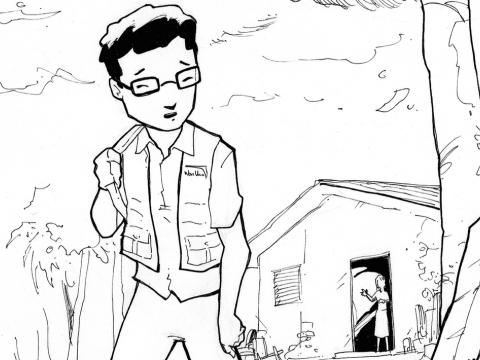Underestimating a disaster is disastrous

By: Ujjal Mondol, as told to Richa Silvia Biswas, Illustration by James Dimanarig
People often have nostalgia when recollecting the sweet memories of the past. In my case the nostalgia is quite different. I will remember things that will haunt me until my last breath.
Every time it rains, every time a flood warning is issued, I start to sweat.
Six years ago, I faced one of the biggest disasters in my country’s history. I was newly married – just 10 days – when a call directed me to prepare.
I was going to help other people but I worried if my own family would be safe.
The storm was called ‘Aaila’ – a tropical cyclone that would eventually kill 334 people and leave 40,000 people homeless in the area where I worked in southwest Bangladesh.
As an employee of World Vision, I needed to act. As I left my bride behind, I was afraid. I was going to help other people but I worried if my own family would be safe. I left with a heavy heart and a prayer.
As soon as my team and I hit the ground, we started warning families about the impending Signal 6 storm. We spoke on megaphones, urging people to take shelter, traveling from neighbourhood to neighbourhood.
Read part 2 of the humanitarian illustrated blog series - balancing the call of duty and family needs during a disaster.
The wind was already so powerful that some of the dams started breaking. With this, we knew something monstrous was going to happen.
Still, people chose to ignore the message of taking shelter.
The people of Assasuni were not used to facing disasters as they hadn’t faced one since 1988. Even when Sidr, another bigger disaster hit Bangladesh in 2007, the people of Assasuni were not affected. So, they believed that this time they would be safe too.
But nature is good at giving both surprises and shocks. The biggest shock for the people of Assasuni was the arrival of Aaila during the high tide, when people were still at home.
The river’s dams broke easily at high tide. Within several minutes, a tidal surge filled the entire area. People were dragged to the river by the wave. There was nothing we could do.
I have never seen people so helpless in my lifetime.
I can still remember the painful outbursts of people. The scene of a disabled child trying to survive still tears my heart apart. I still ask God for the reason why this disaster occurred, when I think about the destitute situation of the children.
Those who were not caught by the wave were running desperately to save themselves. They were also emotionally torn on whether to save their own lives, their neighbors, or their livestock– often their only source of income.
Those who were not caught by the wave were running desperately to save themselves.
They were crying for help. Everyone was in need. No one had time to assist others in those moments. Soon, the whole area of Assasuni was under water.
The cyclone destroyed hygiene systems – human waste mixed in with the floodwater. Health facilities were closed. Clean water was unavailable. It was terrible.
People were astonished. They realised they had underestimated the disaster but it was too late.
Around 8,000 households were affected in World Vision’s Assasuni programme area. In the immediate aftermath, World Vision provided relief packages of food, candles, and clothes to the vulnerable families.
Their faces still come into my mind.
Later on, we assisted 500 households who were living close to the dams with tents and temporary shelter material. World Vision also provided clean water for the community and started cash for work programmes to aid survivors and help cleanup the communities.
Later, when I returned home to my wife, I reflected on the importance of being prepared and following early warning messages. I now know why it’s important to build a toilet on a higher place. I understand the importance of taking special care of children, pregnant women, the disabled, and the elderly during a disaster.
Now, I’m a father of a one-year-old child. My goal is for my daughter to understand the importance of being prepared for an emergency. Through my work, I am teaching the children of my community how to be prepared for a disaster. We encourage families to have dry food, water, a temporary burner, and fuel for cooking to use in an emergency.
I believe that we cannot avoid disasters but we can decrease the affect of the disaster in our life. By properly preparing we are able to save ourselves from the harmful effects of a disaster.
About the author | Ujjal Mondol works as a World Vision Disaster Management officer in the Assasuni programme area.